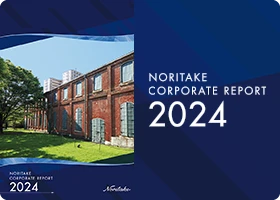Disclosure based on TCFD Recommendations
Sustainability Initiatives
- Sustainability at Noritake
- Contribute to the Global Environment
- Contribute to a Convenient Society
- Contribute to the People’s Well-being
- Strengthen the Foundation
- Management Structure
In August 2022, Noritake announced its endorsement of the Task Force on Climate-Related Financial Disclosures (TCFD*) recommendations established by the Financial Stability Board (FSB).
Since its founding, Noritake has operated its business under the basic philosophy of "contributing to society through business." We recognize the protection of the global environment, a major issue for society, to be one of our most important management issues. In line with TCFD recommendations, we identify risks and opportunities, consider countermeasures, and incorporate them into our management strategies.

TCFD
TCFD stands for Task Force on Climate-Related Financial Disclosures and was established in December 2015 by the Financial Stability Board (FSB) at the request of the G20. In June 2017, the TCFD released a report recommending the disclosure of information on risks and opportunities related to climate change, and companies and institutions around the world have endorsed the recommendations.
Scope of consideration
The business scope covered all major businesses, including Group companies, and the geographical scope covered Japan, which has a high proportion of sales, as well as the other major overseas areas.
The base year for the risk and opportunity assessment is set at 2030, when social changes towards a low-carbon society will have an impact on our business.
Reference scenarios
Reference is made to the IEA World Energy Outlook 2021*1 for transition risks and the SSP scenario*2 of the Intergovernmental Panel on Climate Change (IPCC) for physical risks.
*1 NZE (Net Zero Emission by 2050) for the 1.5°C scenario, APS (Announced Pledges Scenario) and SDS (Sustainable Development Scenario) for the 2°C scenario, and STEPS (Stated Policies Scenario) for the 4°C scenario
*2 SSP1-1.9 for 1.5°C scenario, SSP1-2.6 for 2°C scenario, and SSP5-8.5 for 4°C scenario
Governance
Under the Sustainability Management Committee, chaired by the President, the Environmental Committee leads the Noritake Group's initiatives related to climate change. The Committee formulates unified guidelines for environmental protection activities, promotes these initiatives, manages progress, and implements corrective measures as necessary.
Strategy
The Noritake Group's strategy consideration process is as follows.

In 2030, it is assumed that in the 2°C or 1.5°C scenarios, there will be a significant impact on societal changes due to policy transitions, while in the 4°C scenario, there will be a greater focus on physical impacts such as weather-related events. In light of this, our Group has examined risks and opportunities based on two scenarios: the "risks related to the transition towards a low-carbon society" which would occur during the progression to the 2°C or 1.5°C scenario, and the "risks related to the physical impacts associated with climate change" which would arise if the global fails to achieve adequate climate change mitigation measures and reaches the 4°C scenario.

*1 Vision of society in 2030 under the scenario of an expected temperature rise of 1.5°C to 4°C by 2100
*2 ZEV: Zero Emission Vehicle
*3 MLCC: Multi Layered Ceramic Capacitor
9 risks have been identified for the Noritake Group, and the magnitude of their impact in 2030 has been assessed as follows.

In contrast, the magnitude of opportunities impact in 2030 is assessed as follows.

The Noritake Group is required to take measures to turn risks into opportunities and to increase management resilience.

* CCUS: Carbon dioxide Capture, Utilization and Storage
Risk Management
In regard to risks related climate change, a taskforce established in 2022 analyzed, assessed and reported to the Board of Directors
The Risk Management Committee, newly established in 2024, will analyze and evaluate climate change and all other risks surrounding our Group, identify key risks, and manage efforts to avoid or mitigate them.
Indicators and Targets
In order to transition to a low-carbon society and to achieve net-zero CO2 emissions by 2050, the Noritake Group has set targets to reduce its CO2 emissions (Scope 1 and 2) to 73,000 tons by FY2024 (25% reduction from FY2018) and to 49,000 tons by FY2030 (50% reduction from FY2018). We will also review the method to calculate CO2 emissions from companies in the supply chain other than our Group companies (Scope 3), and set targets and examine the approach to achieve them.
Scope1, 2 (company's CO2 emissions) reduction plan










